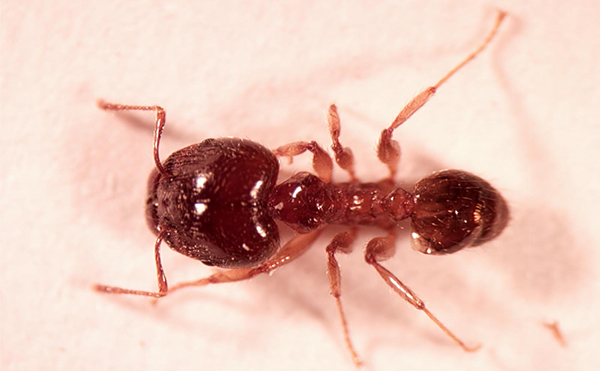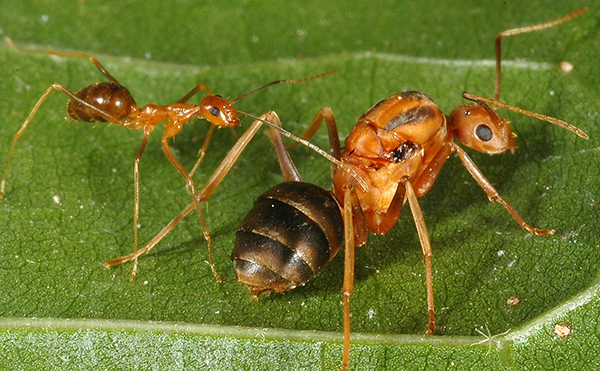The six most serious invasive ant species that are present in Australia are:

- Yellow crazy ant (Anoplolepis gracilipes)
- Tropical fire ant (Solenopsis geminata)
- African big-headed ant (Pheidole megacephala)
- Singapore ant (Monomorium destructor)
- Red imported fire ant (Solenopsis invicta)
- Argentine ant (Linepithema humile).
In natural environments, some invasive ants form super colonies that can eliminate many native animal species and seriously disrupt ecological processes.
In agricultural and horticultural areas, invasive ants are capable of destroying crops, either directly by damaging fruit or indirectly by causing outbreaks of sap-sucking insects that harm plants. Some species, such as the Tropical fire ant, have powerful stings which can result in red itchy lumps lasting several days. Others are able to damage houses and buildings, particularly electrical items, plastic cabling and pipes.
Invasive ants readily nest in all kinds of materials, from potting mix to packaging, making it very easy for them to be accidentally transported by people.
Research on invasive ant management and impacts

CSIRO is collaborating with a range of organisations to effectively manage invasive ant incursions, especially on Indigenous lands and in conservation areas, as well as undertaking research to improve invasive ant management.
We are documenting the impacts of invasive ants on biodiversity and ecological function, and our research is contributing to a broader theoretical understanding of how and why invasions occur. We are focusing on the use of RNA interference as a non-toxic and species-specific tool for invasive ant management that eliminates the potential for non-target impacts.
CSIRO is currently involved in the following projects:
- Yellow crazy ant eradication in north-east Arnhem Land in the Northern Territory in collaboration with Dhimurru Aboriginal Corporation and Rio Tinto.
- African big-headed ant and Tropical fire ant eradications on the Tiwi Islands, north of Darwin, Northern Territory in collaboration with the Tiwi Land Rangers and Tiwi Plantation Corporation.
- Providing scientific advice to the Lord Howe Island Board on African big-headed ant eradication on Lord Howe Island.
- Providing scientific advice to the Australian Government on the management of Tropical fire ants on Ashmore Reef.
- Providing scientific advice to the Australian Government on the management of Yellow crazy ants on Christmas Island.
- Providing scientific advice to the Norfolk Island Administration on the eradication of Argentine ants on Norfolk Island.
- Providing scientific advice to Reef Catchments Ltd on African big headed ant eradication on Bushy Island within the Great Barrier Reef.
The six most serious invasive ant species that are present in Australia are:
- Yellow crazy ant (Anoplolepis gracilipes)
- Tropical fire ant (Solenopsis geminata)
- African big-headed ant (Pheidole megacephala)
- Singapore ant (Monomorium destructor)
- Red imported fire ant (Solenopsis invicta)
- Argentine ant (Linepithema humile).
In natural environments, some invasive ants form super colonies that can eliminate many native animal species and seriously disrupt ecological processes.
In agricultural and horticultural areas, invasive ants are capable of destroying crops, either directly by damaging fruit or indirectly by causing outbreaks of sap-sucking insects that harm plants. Some species, such as the Tropical fire ant, have powerful stings which can result in red itchy lumps lasting several days. Others are able to damage houses and buildings, particularly electrical items, plastic cabling and pipes.
Invasive ants readily nest in all kinds of materials, from potting mix to packaging, making it very easy for them to be accidentally transported by people.
Research on invasive ant management and impacts
CSIRO is collaborating with a range of organisations to effectively manage invasive ant incursions, especially on Indigenous lands and in conservation areas, as well as undertaking research to improve invasive ant management.
We are documenting the impacts of invasive ants on biodiversity and ecological function, and our research is contributing to a broader theoretical understanding of how and why invasions occur. We are focusing on the use of RNA interference as a non-toxic and species-specific tool for invasive ant management that eliminates the potential for non-target impacts.
CSIRO is currently involved in the following projects:
- Yellow crazy ant eradication in north-east Arnhem Land in the Northern Territory in collaboration with Dhimurru Aboriginal Corporation and Rio Tinto.
- African big-headed ant and Tropical fire ant eradications on the Tiwi Islands, north of Darwin, Northern Territory in collaboration with the Tiwi Land Rangers and Tiwi Plantation Corporation.
- Providing scientific advice to the Lord Howe Island Board on African big-headed ant eradication on Lord Howe Island.
- Providing scientific advice to the Australian Government on the management of Tropical fire ants on Ashmore Reef.
- Providing scientific advice to the Australian Government on the management of Yellow crazy ants on Christmas Island.
- Providing scientific advice to the Norfolk Island Administration on the eradication of Argentine ants on Norfolk Island.
- Providing scientific advice to Reef Catchments Ltd on African big headed ant eradication on Bushy Island within the Great Barrier Reef.
